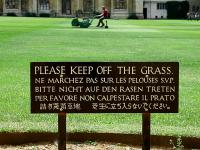Transition Culture has moved
I no longer blog on this site. You can now find me, my general blogs, and the work I am doing researching my forthcoming book on imagination, on my new blog.
Come find me at robhopkins.net
Archive for “Food” category
Showing results 251 - 255 of 267 for the category: Food.
26 Apr 2006
 **Review of CPULs – Continuous Productive Urban Landscapes. Designing Urban Agriculture for Sustainable Cities. Andre Viljoen (ed) 2005. Architectural Press.**
**Review of CPULs – Continuous Productive Urban Landscapes. Designing Urban Agriculture for Sustainable Cities. Andre Viljoen (ed) 2005. Architectural Press.**
Great book, terrible title. Andre Viljoen has put together a book of the most profound importance at this point in history. How will we feed our cities beyond the age of cheap oil? Does the old concept that the cities are for people to live in and the countryside is for growing food in still have any relevance when our cheap transport system is no longer able to function? Viljon argues not. We should view our cities as much in terms of being productive spaces as we view our rural areas.
Read more»
24 Apr 2006
 The UK Interdependence Report: How the world sustains the nation’s lifestyles and the price it pays by Andrew Simms, Dan Moran and Peter Chowla has just been published, and is essential reading for those of us promoting localised responses to peak oil. Produced by the excellent New Economics Foundation, it builds on the concept of ‘Ecological Debt’, as outlined in Andrew Simms’ book of the same name.
The UK Interdependence Report: How the world sustains the nation’s lifestyles and the price it pays by Andrew Simms, Dan Moran and Peter Chowla has just been published, and is essential reading for those of us promoting localised responses to peak oil. Produced by the excellent New Economics Foundation, it builds on the concept of ‘Ecological Debt’, as outlined in Andrew Simms’ book of the same name.
Read more»
3 Apr 2006
 The terrible case of Charles Martin, the Ohio man who shot a neighbour’s son to death for walking on his lawn has shown us the flipside of our cultural neurotic obsession with lawns, those neat, tidy, manicured, and ultimately useless landscapes. This man was so enraged that someone would walk on his grass that he reached for his shotgun. Lawns are a classic example of our dysfunctional society. Here is a form of land use, described by Stephen Morris as ” the Marine haircut of the plant world”, that uses more energy, pesticides and herbicides (and in some places, water) than agriculture, yet is entirely useless. Where our oil-poor ancestors would have had potatoes and chard, we have lawn. I am delighted to be able to announce to you though, Ladies and Gentlemen, that the Days of the Lawn are numbered.
The terrible case of Charles Martin, the Ohio man who shot a neighbour’s son to death for walking on his lawn has shown us the flipside of our cultural neurotic obsession with lawns, those neat, tidy, manicured, and ultimately useless landscapes. This man was so enraged that someone would walk on his grass that he reached for his shotgun. Lawns are a classic example of our dysfunctional society. Here is a form of land use, described by Stephen Morris as ” the Marine haircut of the plant world”, that uses more energy, pesticides and herbicides (and in some places, water) than agriculture, yet is entirely useless. Where our oil-poor ancestors would have had potatoes and chard, we have lawn. I am delighted to be able to announce to you though, Ladies and Gentlemen, that the Days of the Lawn are numbered.
Read more»
13 Mar 2006
 In an interview with Paul McCartney (which you can hear here) , he talks about the song ‘Yesterday’ (one of my least favourite Beatles songs…). He said he woke up one day with this song in his head, and couldn’t think where he had heard it, and went around asking his friends what this song was. He’d play it to them and they would all tell him they hadn’t heard it before. After a while he realised he must have made it up, but still wondered if one day the person who wrote the original would get in touch (now there’s an idea for making a few quid…). In putting together this, the last in the Top Five Things To Do With Oil Barrels series, I want to offer an idea which, likewise, I am sure is not mine, but which, try as I might, I am unable to find where it came from.
In an interview with Paul McCartney (which you can hear here) , he talks about the song ‘Yesterday’ (one of my least favourite Beatles songs…). He said he woke up one day with this song in his head, and couldn’t think where he had heard it, and went around asking his friends what this song was. He’d play it to them and they would all tell him they hadn’t heard it before. After a while he realised he must have made it up, but still wondered if one day the person who wrote the original would get in touch (now there’s an idea for making a few quid…). In putting together this, the last in the Top Five Things To Do With Oil Barrels series, I want to offer an idea which, likewise, I am sure is not mine, but which, try as I might, I am unable to find where it came from.
Read more»
7 Mar 2006
 Over this week I will be taking a look at five things we could do with oil barrels when we are no longer able to put oil in them. The idea came from the cover of Peter Tertzakian’s new book A Thousand Barrels a Second : The Coming Oil Break Point and the Challenges Facing an Energy Dependent World (you can hear an interview with the author here) which I just started reading, which has a great picture which shows a huge collection of such barrels. Struck me that we’re going to have an awful lot of them left lying about the place, and perhaps they might become rather useful things.
Over this week I will be taking a look at five things we could do with oil barrels when we are no longer able to put oil in them. The idea came from the cover of Peter Tertzakian’s new book A Thousand Barrels a Second : The Coming Oil Break Point and the Challenges Facing an Energy Dependent World (you can hear an interview with the author here) which I just started reading, which has a great picture which shows a huge collection of such barrels. Struck me that we’re going to have an awful lot of them left lying about the place, and perhaps they might become rather useful things.
Read more»
 **Review of CPULs – Continuous Productive Urban Landscapes. Designing Urban Agriculture for Sustainable Cities. Andre Viljoen (ed) 2005. Architectural Press.**
**Review of CPULs – Continuous Productive Urban Landscapes. Designing Urban Agriculture for Sustainable Cities. Andre Viljoen (ed) 2005. Architectural Press.**




